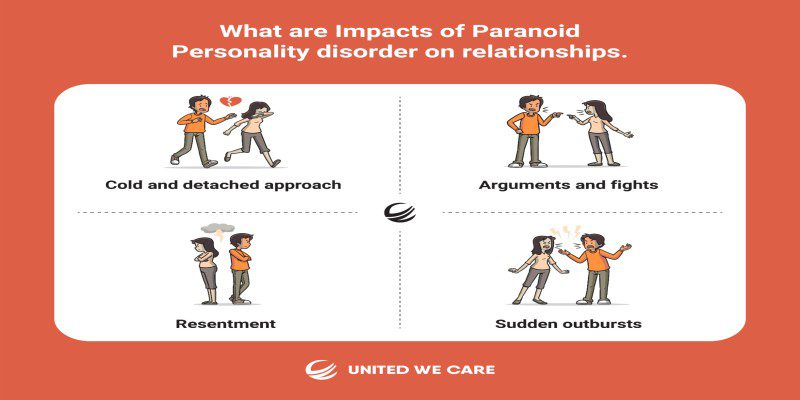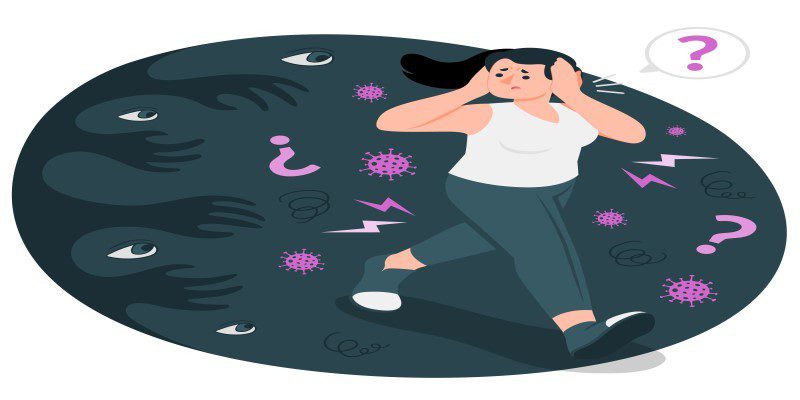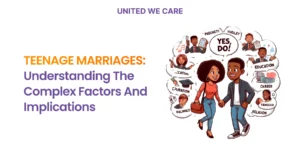Introduction
It can be difficult to have a healthy relationship with a person who has paranoid personality disorder. Paranoid Personality disorder (PPD) is a type of psychiatric illness that affects the personality of the individual. Such individuals are consistently suspicious, mistrustful and hostile towards others.
A person struggling with this illness faces difficulty in forming and maintaining adequate relationships.
In this article, we explore how to manage concerns related to PPD that have a negative impact on relations.
Signs of a Paranoid Personality disorder on relationships
A healthy relationship is built on mutual trust and support. However, any relationship with a person with Paranoid Personality Disorder leads to constant scrutiny and questioning. You might have difficulty managing these concerns and instead distance yourself .
The following are some of the signs that manifest in relationships based on the symptoms of the disorder.
Constant suspicions and mistrust
PPD leads to significant difficulty in perceiving everyday circumstances for what they are. Instead, you are being bombarded by thoughts of hurt or malice. This feeling of being hurt leads to suspicion of other people and a strange environment.
In relationships it translates in the form of not believing another person’s views or explanation. You feel threatened by new people and environemnts.
Monitoring Environment
The feelings of being threatened are regular and distressing. To reassure themselves you might be bombarded with questions about your intentions. They might ask you to recheck new environments or individuals out of fear of harm.
Also, they will go to extreme lengths to reassure themselves that they are secure. You might find yourself constantly checking for escape routes, or avoiding certain spaces.
Doubting loyalty of close people
You will find yourself getting into arguments, quarrels and long unnecessary explanations. Excessive concerns of betrayal and abandonment happen regularly.
You will demand explanations of scenarios and justifications of other’s loyalty. You have constant worries of others hurting you or leaving you.
Concerns of Infidelity
As a romantic partner of a person with PPD, you might have to witness allegations against you. You will find yourself being restricted in several aspects of life due to fear of being cheated upon.
The mistrust and suspicious thoughts will lead to accusations of infidelity, repeatedly. These accusations are not based in reality or evidence.
Issues in Communication
Often, there are sudden anger outbursts or hostility towards others. You might not get a clear explanation or reasoning for the hostility.
Thoughts related to being hurt or betrayed are not directed out of doubt and suspicion. Rather you hide your initial concerns until the situation is unbearable.
High sensitivity to novelty or the unknown
Unknown or new encounters with others will put them on edge. Being in a new environment (new restaurant or the mall) might also make them uneasy.
You try to hide this sensitivity to not appear vulnerable.Fearfulness and avoidance increases in an unknown atmosphere.
Impacts of Paranoid Personality disorder on relationships
It is difficult for an individual with this disorder to have stable relationships. For instance, the mistrust, suspicion and hostility can be difficult to spot. Typically, they assume their concerns to be based in reality and threatening.
This leads to several challenges accumulating and negatively impacting the relationship. Following are the impacts of these challenges.

Cold and detached approach
Firstly, individuals with Paranoid Personality Disorder fear receiving love and care. Due to this attempts at showing love and affection are superficial.
Outward appearance is aloof and lacks warmth due to fear of connection and mistrust.
Arguments and fights
Sometimes, you find yourself looking for detailed explanations and justifications. This leads to tension between couples.
Consequently, you will find yourself getting into fights and arguments frequently.
Resentment
At times, you experience a high need to protect yourself. So, you take special attention to instances where you felt hurt.
You hold on to grudges and find methods to get revenge on other individuals.
Sudden outbursts
You act out on a suspicion or doubt without considering evidence. This makes the reality seem like a lie.
Furthermore, your fear of doubts being true leads to increased hostility and anger outbursts.
How to cope with Paranoid Personality disorder on relationships
Without coping skills, relationships become distressing to the point that they become intolerable. To address this some coping techniques and support are required for the relationship to survive.
Below mentioned are a list of coping skills and suggestions to overcome problems related to PPD.
Normalise feelings of vulnerability
Accepting that you feel vulnerable, and scared of being hurt is helpful. This allows you to address the concerns at face value .
Normalises vulnerability without causing significant distress.
Communication – verbalising distress
Generally, talking out your doubts and concerns helps create empathy in others. You are able to work out the problems.
Verbalising distress is more helpful instead of struggling internally.
Building healthy boundaries
Holding boundaries that are communicated will help you significantly. Healthy boundaries refers to mutually and respectfully agreed responsibilities.
Building mutual respect through boundaries reduces mistrust. You can learn more about healthy relationship building in this article.
Therapeutic interventions
Scientific literature and evidence recommends that you undertake treatment for PPD. Interestingly, both pharmacotherapy and psychotherapy can help you to reduce impact on your interpersonal life.
Look for licensed psychiatrists, psychotherapists and other mental health professionals to avail sound care.
Conclusion
Evidently, Paranoid Personality Disorder (PPD) can lead to detrimental impact on your relationships. Thankfully, understanding the signs and coping skills will help you manage and save your relationships.
If you find similar signs in yourself or a loved one , you need to reach out for professional support. The United We Care app can be a useful resource in getting suitable support.
References
[1] S. Akhtar and *Professor of Psychiatry, “Paranoid personality disorder: A synthesis of developmental, dynamic, and descriptive features,” American Journal of Psychotherapy, https://psychotherapy.psychiatryonline.org/doi/abs/10.1176/appi.psychotherapy.1990.44.1.5 (accessed Oct. 12, 2023).
[2] A. Carroll, “Are you looking at me? understanding and managing paranoid personality disorder: Advances in psychiatric treatment,” Cambridge Core, https://www.cambridge.org/core/journals/advances-in-psychiatric-treatment/article/are-you-looking-at-me-understanding-and-managing-paranoid-personality-disorder/B733818A93FBFB88E1140B195DDCB682 (accessed Oct. 12, 2023).
[3] L. Royce, “Mistrustful and misunderstood: A review of paranoid personality …,” NCBI, https://www.ncbi.nlm.nih.gov/pmc/articles/PMC5793931/ (accessed Oct. 12, 2023).










